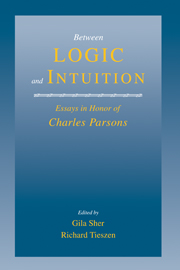Book contents
- Frontmatter
- Contents
- Preface
- I LOGIC
- Paradox Revisited I: Truth
- Paradox Revisited II: Sets – A Case of All or None?
- Truthlike and Truthful Operators
- ‘Everything’
- On Second-Order Logic and Natural Language
- The Logical Roots of Indeterminacy
- The Logic of Full Belief
- II INTUITION
- III NUMBERS, SETS AND CLASSES
- Name Index
Paradox Revisited I: Truth
Published online by Cambridge University Press: 02 December 2009
- Frontmatter
- Contents
- Preface
- I LOGIC
- Paradox Revisited I: Truth
- Paradox Revisited II: Sets – A Case of All or None?
- Truthlike and Truthful Operators
- ‘Everything’
- On Second-Order Logic and Natural Language
- The Logical Roots of Indeterminacy
- The Logic of Full Belief
- II INTUITION
- III NUMBERS, SETS AND CLASSES
- Name Index
Summary
In this pair of essays, I revisit the logical paradoxes. In the present essay I discuss the most famous of the so-called semantical paradoxes, the paradox of the Liar, the sentence that says of itself that it is not true, and in the essay that follows (Paradox Revisited II) I shall consider whether we should really accept a view once expressed by Gödel, the view that the paradoxes of set theory are ones that we can see through, can definitely and satisfactorily resolve, even if (as he conceded) the same cannot be said for the semantical paradoxes.
The Liar Paradox
The best presentation I know of the Liar Paradox is Charles Parsons', and in the end the view I shall defend is, I believe, an elaboration of his. In “The Liar Paradox,” a paper I have thought about for almost twenty years, the paradox is stated in different ways. One of these ways is in terms of three alternatives: either a sentence expresses a true proposition, or it expresses a false proposition, or it does not express a proposition at all. A second way mentioned in that paper is the one I followed in my presentation of the Liar paradox in Realism with a Human Face, in which talk of propositions is avoided, and I mostly employ that way here in order to facilitate comparison with Tarski's work.
Information
- Type
- Chapter
- Information
- Between Logic and IntuitionEssays in Honor of Charles Parsons, pp. 3 - 15Publisher: Cambridge University PressPrint publication year: 2000
Accessibility standard: Unknown
Why this information is here
This section outlines the accessibility features of this content - including support for screen readers, full keyboard navigation and high-contrast display options. This may not be relevant for you.Accessibility Information
- 4
- Cited by
